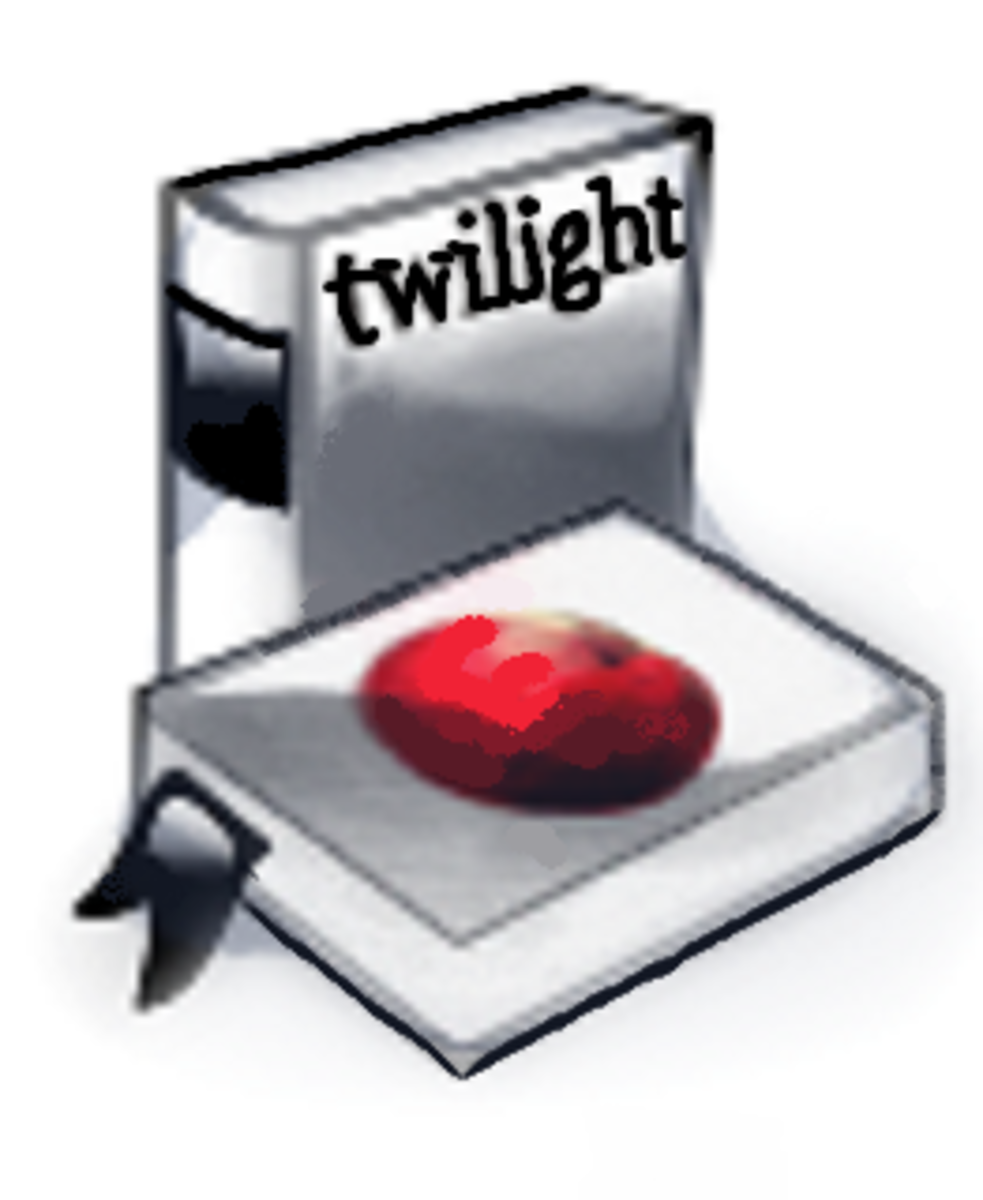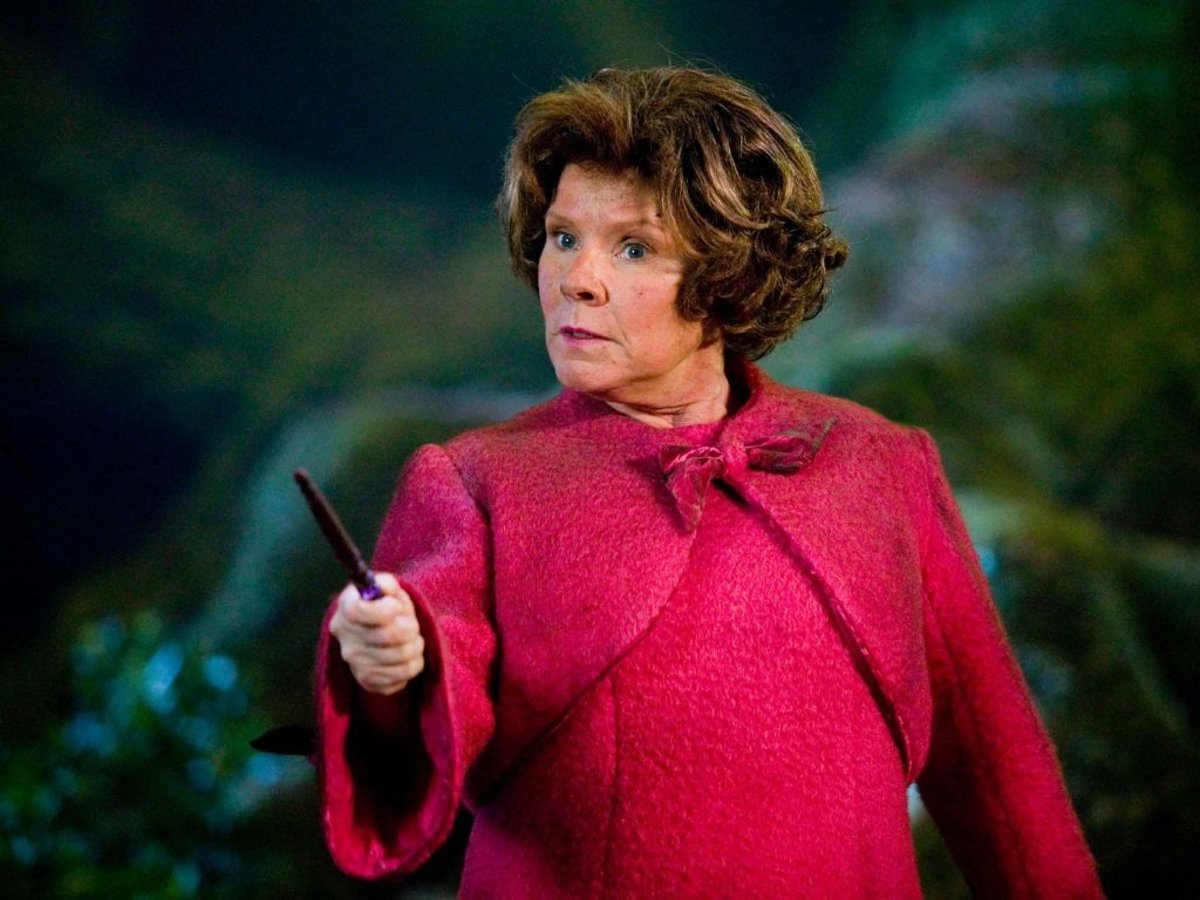- HubPages»
- Books, Literature, and Writing»
- Books & Novels»
- Books for Teens & Young Adults»
- Young Adult Fantasy, Supernatural & Sci-Fi Books
What To Read After The Hunger Games Trilogy

So you enjoyed The Hunger Games and since you’d never read anything quite like it before, you’re not sure what to read next? The dystopian novel is enjoying a wave of popularity, so there is plenty of reading material to choose from. Like The Hunger Games, many of the stories are series of novels rather than single titles.
Although most of the novels reviewed here are recently written, no review of dystopian novels would be complete without including Nineteen Eighty-Four by George Orwell, written in 1948. Although many experts consider H.G Wells’ novels The Story of the Days To Come and When The Sleeper Wakes to be the first dystopian novels, Nineteen Eighty-Four is the definitive and most influential dystopian novel of all time. Many phrases that are now in everyday use come from Nineteen Eighty-Four; for example: “Big Brother,” “double-think,” and “thought police.”
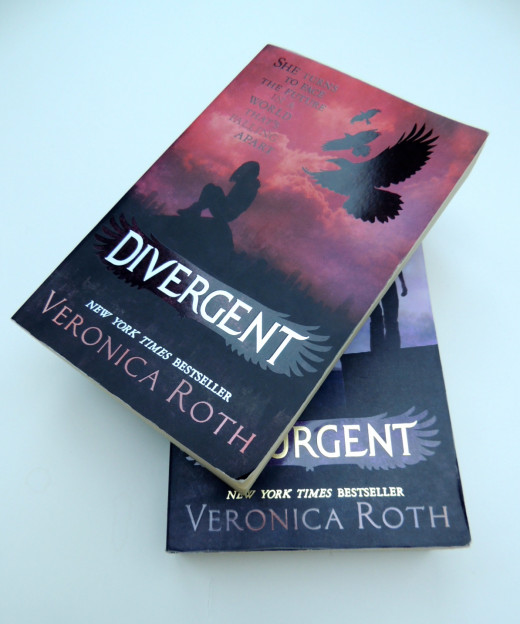
Divergent is available on Amazon
The Divergent Series by Veronica Roth
This series consists of two books so far: Divergent and Insurgent. There’s a third on the way, and Veronica Roth has jokingly said it will be called Detergent!
However these books are not comedies, but are definitely dystopian novels. They are set in Chicago of the future and like The Hunger Games feature a sixteen year-old girl.
Chicago is fenced in and its inhabitants are divided into 5 factions: Abnegation, Amity, Candor, Dauntless and Erudite. Each of these factions values one quality above all other: Abnegation values selflessness, Amity values peace, Candor values honesty, Dauntless values bravery and Erudite values knowledge.
Although everyone is born into a faction, at sixteen they must sit an aptitude test that will reveal to which faction they are most suited. After that they must choose the faction to which they will belong for the rest of their lives - they don't have to choose the one they most suited to, but after choosing, the young people must undergo initiation into their chosen faction. Failure complete initiation makes a person factionless. The factionless get the unpleasant jobs that nobody else wants and live in poverty.
Tris was born into Abnegation, but unlike her brother Caleb, selflessness does not always come naturally to her. By the day of her aptitude test she already knows she wants to leave her family, even if she doesn’t know which faction she wants to join. Her aptitude test is equally inclusive: Tris could belong to Abnegation, Dauntless or Erudite, making her a Divergent. This, the test administrator warns, is extremely dangerous. She tells Tris never to tell anyone the result of her test.
At the choosing ceremony, Tris is already struggling to make her decision when Caleb is called and chooses Erudite. If he isn’t suited to Abnegation, what chance does she have? She chooses Dauntless.
Now Tris must learn to fight, something she has never done before. And she must do it without drawing attention to herself, without anyone realizing she is Divergent.
How is the Divergent Series like The Hunger Games?
These novels deal with violence in a similar way to The Hunger Games, not glorifying it but showing its destruction of society and individual people. By the opening of Insurgent Tris is traumatized.
Both series contain a rebellion against government, and in Insurgent Tris must fight in that rebellion.
How is the Divergent Series different to The Hunger Games?
It is contained within a city and there is no reality television element.

A well read copy of Slated
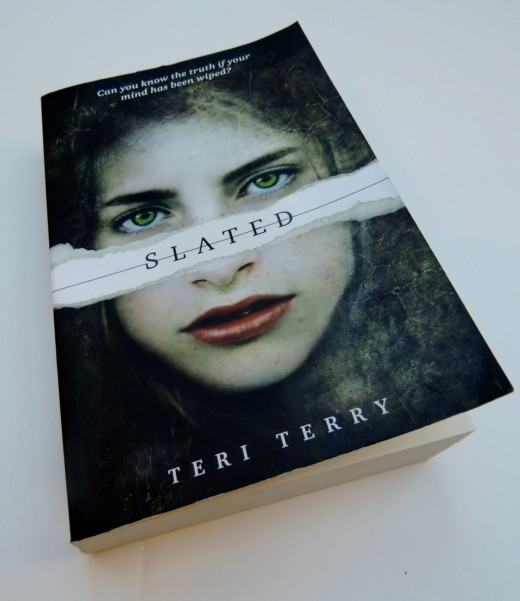
Slated
Slated by Teri Terry
This novel is dark, both in subject matter and in atmosphere. It has the feel of a movie filmed in semi-darkness.
It opens with what could be a dream or a memory: someone is running through dunes, and an unnamed man urges her to, “Put up the wall!” He also shouts, “Never forget who you are!”
The importance of this soon become apparent when we meet Kyla, a sixteen-year-old girl who has been slated. She is in a hospital somewhere in London and is about to go home with her family. Except the Slated are taken from their families and placed in new families, so she has never met them before.
As far as Kyla knows, she used to be a terrorist. That’s what the government says, and all young people under eighteen who have committed a crime are slated. This means that they are have all their memories wiped and are given new memories.
They must wear a “Levo” on their wrist to measure their happiness levels. Anger, depression and other negative emotions make the Levo’s reading drop – and if it goes too low they could pass out or even die. Chocolate raises the Levo and so does the jab from a nurse’s needle just before Kyla goes to meet her new parents.
But as the opening sequence suggests, Kyla’s past doesn’t stay as buried as it should. And remembering the past can be dangerous for the Slated. To make matters worse, there’s a boy that Kyla likes, and that is forbidden for the newly slated.
This novel keeps you one edge, desperate to read on, and can be enjoyed by anyone from 14 to 94. (Okay I don’t actually know any 94 year-olds who have read it, but my 14 year-old daughter loves it and has got me hooked too!)
Slated is the first book in a series, and its sequel Fractured is due for publication in May 2013.
How is Slated similar to The Hunger Games?
It has a dystopian setting, with a sinister government. The main character is a strong, sixteen year-old girl. She is in danger, and the chance of happiness with the boy she likes seems as fragile as it did for Katniss and Peeta.
How is Slated different to The Hunger Games?
It is set in the UK rather than North America, and the action takes place in an area outside London rather than in an arena. There is no reality television show. The violence is subtler, but chilling: people disappear rather than die.

The Selection
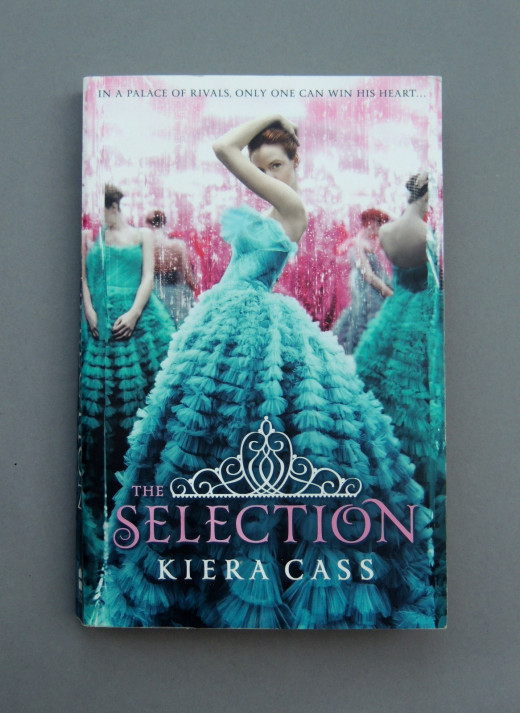
The Selection on Amazon
The Selection by Keira Cass
The Selection is much lighter than the other novels reviewed, and could probably be described as a dystopian Cinderella.
This novel opens at a time of relative peace after a big war, and what was once the United States is now Illéa, ruled by a monarch. The war ended in a major treaty with China, and now Halloween are a thing of the past and New Year is celebrated in January or February, depending on the moon.
This is important to America Singer, the main character. Her family belongs to the artists’ caste, just three from the bottom of Illéa’s caste system, and it is at these celebrations that artists make their money by singing and selling their art. Illéa’s society is structured into 8 castes, with royalty at number 1 and the homeless at 8. Those in higher castes have plenty of wealth, while the poorer castes are left to struggle. Rebels frequently attack the Palace or government buildings, including the local magistrates’ building.
When a letter arrives inviting America to take part in a reality television show, her mother is ecstatic. This is their way out of their financial difficulties. For this reality show is The Selection, and the prize is Prince Maxon.
America doesn’t want to take part because she is secretly in love with Aspen. He is from a caste lower than America and his family struggle to have enough food. But proud Aspen resists America’s attempts to give him food. And he shocks her by saying she should enter The Selection.
Reassuring herself that she won’t be picked, America reluctantly agrees. Of course, she is picked to appear in the show (or the novel would be over rather quickly!) She becomes friends with Prince Maxim, too, but everything is far from straightforward because she still loves Aspen.
How is The Selection similar to The Hunger Games?
It has a reality television show, with a heroine who would rather not be there. It has a love triangle.
How is The Selection different to The Hunger Games?
Although rebels attack The Palace while she is there, America is not in constant danger. At the start of the novel she does whatever others want of her, and has doesn’t know her own mind. Rather than fighting of her life as in the other dystopian novels, she is learning to follow her own path.
This novel is definitely aimed at teens rather than young adults.

Nineteen Eighty-Four
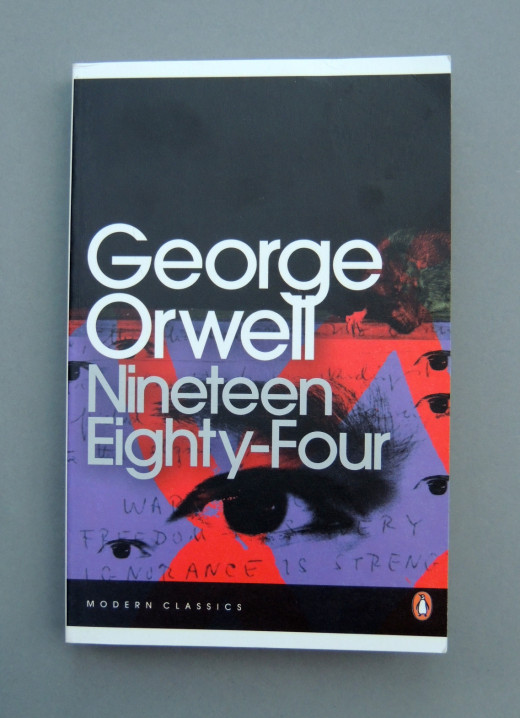
Nineteen Eighty-Four by George Orwell
This is probably the all-time number one dystopian novel, and if you like the genre you really have to read it! Its opening sentence is a powerful example of scene setting: “It was a bright cold day in April, and the clocks were striking thirteen.”
George Orwell wrote Nineteen Eighty-Four in 1948, three years after World War 2 ended, and just as the western world and the communist countries of Eastern Europe began the “Cold War.” This was a time of great distrust and frequently it seemed that a major war might break out. The United States and the USSR were the two major countries on the opposing sides, with China in the throes of civil war.
This distrust was the background for Nineteen Eighty-Four, in which the world was divided into 3 major states: Oceania, Eurasia and Eastasia. These three states are perpetually forming into groups of two against one, but then arguing and breaking the alliance. There is perpetual low level war over the parts of the world that are not owned by these superpowers, and one of the government slogans is: War is Peace. The head of government is a dictator, known as “Big Brother.” Everywhere there are posters with the slogan, “Big Brother is watching you,” and everywhere there are telescreens through which the government watches its people. However, no one ever sees “Big Brother.”
The main character in Nineteen Eighty-Four is Winston Smith, a middle aged man who lives in London, “the chief city of Airstrip One.” He works for the "Ministry of Truth" and his job is to revise history to fit in with current government policy. Anyone who has fallen out of favor (or been killed) is a nonperson and must be removed from history. (This policy may sound far-fetched, but Orwell didn’t have far to look for inspiration: at the time the Russian leader Stalin did have photographs touched up to remove former allies whom he had had removed or killed.)
However, Winston Smith secretly despises the government, and keeps a journal of his “negative thoughts.” He hides in an alcove of his apartment to do this, in the belief that the telescreen’s camera doesn’t reach that far. But even if he didn’t write a word, he had committed the worst crime of all: Thoughtcrime. So he lives in fear of being found out.
Meeting, and falling in love with Julia, does nothing to ease that fear, since all relationships are forbidden unless sanctioned by the Party.
Can Winston and Julia take on the might of Big Brother and win, or will they be destroyed? You’ll have to read the ultimate dystopian novel to find out!

See how the novels compare on key aspects
Book or series
| Main Character
| Dystopian Future
| Star Crossed Love Interest
| Imminent Danger for Main Character and Loved Ones
| Sinister Government
| Reality Television
| Young Adult
|
|---|---|---|---|---|---|---|---|
Hunger Games
| 16 year old girl
| Yes
| Yes
| Yes
| Yes
| Yes
| Yes
|
Divergent Series
| 16 year old girl
| Yes
| Secret
| Yes
| Yes
| No
| Yes
|
Slated
| 16 year old girl
| Yes
| Yes
| Yes
| Yes
| No
| Yes
|
The Selection
| girl in late teens
| Yes
| Love triangle
| Mild danger from rebels
| No, but caste system and rebels
| Yes
| Teen
|
Nineteen Eighty-Four
| middle aged man
| Yes
| Yes
| Yes
| Yes
| No
| General
|
Some Other Novels You Might Enjoy
These are two more books, enjoyed by many people who like the Hunger Games:
The Maze Runner by James Dashner
Gone by Michael Grant
Shades of Grey by Jasper Fforde (This is not the steamy book by the same name that's currently popular.)











